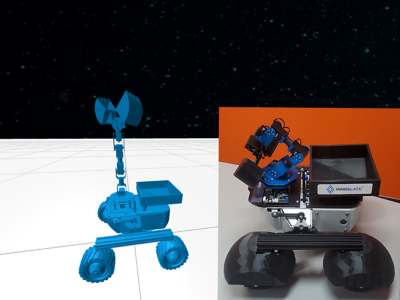-
United States -
United Kingdom -
India -
France -
Deutschland -
Italia -
日本 -
대한민국 -
中国 -
台灣
-
Ansys stellt Studierenden auf dem Weg zum Erfolg die Simulationssoftware kostenlos zur Verfügung.
-
Ansys stellt Studierenden auf dem Weg zum Erfolg die Simulationssoftware kostenlos zur Verfügung.
-
Ansys stellt Studierenden auf dem Weg zum Erfolg die Simulationssoftware kostenlos zur Verfügung.
-
Kontakt -
Karriere -
Studierende und Akademiker*innen -
Für die Vereinigten Staaten und Kanada
+1 844,462 6797
PRESS RELEASE
DATE: 12/01/2021
Ansys Empowers SPEC Innovations to Shoot for the Moon in NASA Challenge
SPEC Innovations cuts the cost and time of developing a digital twin of a lunar rover by 1,000% with Ansys’ simulation software
Key Highlights
- Ansys simulation solutions provide design analysis for Moon excavation system architecture
- SPEC Innovations pairs cloud-based Innoslate with simulation to achieve digital engineering to design, build, and test a lunar rover
- Innoslate and SPEC Innovations substantially reduce time and cost using Ansys’ product portfolio
PITTSBURGH, PA, December 1, 2021 – A leader in systems engineering, SPEC Innovations is applying Ansys (NASDAQ: ANSS) simulation solutions to develop a digital twin of a lunar rover to better enable Moon excavation in response to NASA’s Break the Ice Lunar Challenge.
With Ansys’ best-in-class tools, SPEC Innovations devised a cloud native, cost-effective solution to the innovation challenge, which aims to inspire new technologies to help establish a consistent human presence on the Moon by 2030. To operate on the Moon, robotic systems must withstand brutal environments in dark, shadowed regions of the lunar south pole, while canvassing its surface for water.
SPEC Innovations is applying Ansys simulation solutions to develop a digital twin of a lunar rover to better enable Moon excavation. Image courtesy of SPEC Innovations.
By integrating its cloud-based web application Innoslate with Ansys SpaceClaim 3D modeling software and AGI Systems Tool Kit (STK) analysis platform, SPEC Innovations reached primary goals through digital engineering; these goals include excavating icy regolith and increasing water mining, while minimizing equipment and power consumption. Further, by leveraging Ansys, SPEC Innovations was able to validate mission processes during design analysis and substantially reduce time and cost.
“Ansys SpaceClaim allowed SPEC Innovations to cut cost and time by 1,000%,” said Steven H. Dam, Ph.D., ESEP, president and chief operating officer at SPEC Innovations. “It enabled a rapid modification of the commercial-off-the-shelf (COTS) rover to enable the addition of key components, including a robot arm, collection bin, and fenders, using an inexpensive 3D printer. Such development would have been cost prohibitive if developed by other methods.”
Innoslate offers cloud computing, artificial intelligence (AI) technology, and functionalities including project management to complete the digital thread experience within a single model-based systems engineering (MBSE) tool.
“Digital engineering and digital twins are the next phase of innovation in our world,” said Prith Banerjee, chief technology officer at Ansys. “And by leveraging things like AI, machine learning (ML), and cloud computing, simulation is at the forefront of space exploration with more potential than ever to impact product innovation—from Earth to the Moon and beyond.”
NASA’s Break the Ice Lunar Challenge program conducted its first phase, which focused on system architecture innovation, from November 2020 through August 2021. Its second phase, once initiated, will focus on designing and validating systems.
About Ansys
If you've ever seen a rocket launch, flown on an airplane, driven a car, used a computer, touched a mobile device, crossed a bridge, or put on wearable technology, chances are you've used a product where Ansys software played a critical role in its creation. Ansys is the global leader in engineering simulation. Through our strategy of Pervasive Engineering Simulation, we help the world's most innovative companies deliver radically better products to their customers. By offering the best and broadest portfolio of engineering simulation software, we help them solve the most complex design challenges and create products limited only by imagination. Founded in 1970, Ansys is headquartered south of Pittsburgh, Pennsylvania, U.S.A. Visit www.ansys.com for more information.
Ansys and any and all ANSYS, Inc. brand, product, service and feature names, logos and slogans are registered trademarks or trademarks of ANSYS, Inc. or its subsidiaries in the United States or other countries. All other brand, product, service and feature names or trademarks are the property of their respective owners.
ANSS–C
Los geht's
Wenn Sie mit technischen Herausforderungen konfrontiert sind, ist unser Team für Sie da. Mit unserer langjährigen Erfahrung und unserem Engagement für Innovation laden wir Sie ein, sich an uns zu wenden. Lassen Sie uns zusammenarbeiten, um Ihre technischen Hindernisse in Chancen für Wachstum und Erfolg zu verwandeln. Kontaktieren Sie uns noch heute, um das Gespräch zu beginnen.











